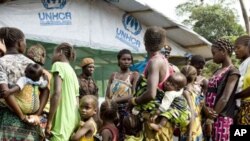Liberia continues to be the main safe haven for Ivoirian refugees. Large numbers are now reported in Liberia’s Maryland County. In recent weeks and months, most of the refugees were in Nimba and Grand Gedeh Counties.
Oxfam engineer Shemeles Mekonnen, who’s in the Maryland County town of Harper, said from April 6 through 9, “There was a big influx of refugees…around 4000 to 4,500 refugees came through different border towns and then came to the transit camp in one of the schools given by the Catholic church.”
Long journey
“Most of them,” he said, “walked two to three days before they reached the border.”
The U.N. refugee agency [UNHCR] and other groups provided the refugees with non-food items. Many arrived with no provisions.
“At the moment we have around 6,000 refugees settled at the transit camp, where Oxfam is providing clean water and sanitation and hygiene promotion activities, as well as at the weigh station, where UNHCR is registering the refugees,” he said.
Maryland County
Mekonnen said some of the refugees are from the town Tabou, where they were targeted by unknown groups. Some were shot. He said refugees are hoping to learn the whereabouts of their family members after being separated during their trek.
“Since we were overwhelmed by the number of refugees [who] came to the camp, we are starting now to cope with all the necessary services we are providing to the refugees,” he said.
Oxfam specializes in providing clean water and sanitation facilities, including latrines and places to bathe. It’s currently transporting clean water to the refugees using trucks and animals. UNHCR has provided jerry cans and wash basins.
“At the moment we are providing 10 to 15 liters per person per day of clean water for cooking, drinking and other purposes,” he said.
Oxfam hopes to eventually increase that amount to 15 to 20 liters per person per day once more supplies arrive from the capital, Monrovia.
“There are limited resources in Harper. Harper is a small coastal town and also suffered from the previous conflict [in Liberia]. And we have a very limited infrastructure here,” said Mekonnen.
The refugee transit camp on the outskirts of Harper is a former Catholic boarding school that had been abandoned. Oxfam and other aid agencies repaired it.
Meanwhile, UNHCR and Liberian officials have found a suitable site for a large refugee camp about 9 kilometers further inland. The camp would provide shelter for about 15,000 refugees, including those at the border weigh station and transit center.




